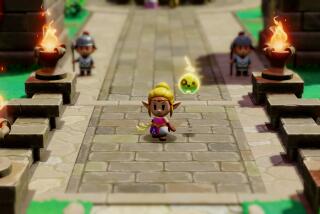Video games propose a radical idea: We need to be nicer
In the free game “SweetXheart,” a young woman is walking to the train, hoping she won’t be late for school. She sees that a man is looking at her, and before she can cross the street, he tells her that he just wants to say hello. Fine. Hello, she says. And then he adds that her outfit this day is particularly sexy. The woman can ignore him, tell him off or just say she isn’t interested.
All these choices leave Kara in turmoil. Was she being harassed? Or maybe she misread someone’s misguided but not necessarily evil intentions? Did standing up for herself, in turn, hurt someone else’s feelings? Does that matter, and if not, why is she still thinking about it?
Getting through the day in “SweetXheart” without feeling emotionally exhausted is a challenge. It’s a game that takes a look at the toll of daily transgressions, be it an offensive cat-caller, a boss calling you by a pet name or simply realizing a friend group didn’t invite you to hangout. It asks us to think about how these moments all add up to affect our emotional well-being.
On a micro level, it’s a game about race, class and gender, asking players to experience one week in the life of a 19-year-old black woman, but zoom out and it becomes clear that “SweetXheart” has larger ambitions. It’s a game about how we communicate.
We’re accustomed to games, even the most nuanced, beginning with a clear problem: an outlaw on the run, a world in peril, a loved one kidnapped and held hostage by a gorilla.
“Every interaction that you have with people — or that I have with people — comes with a cost,” says “SweetXheart” developer Catt Small, noting that she hopes the game asks us to to think about the benefits of vulnerability. “I’ve been taught to not be a vulnerable person. One of the things I learned making this game and doing this project is often the response that feels easiest to do is not the correct one. Instead of closing off, because it feels safe, sometimes it’s better to open up.”
“SweetXheart” is one of more than 50 games or interactive experiences that will be showcased this weekend at Santa Monica College as part of IndieCade, an annual event designed to celebrate a more thoughtful side of the game industry. Typically, no matter where the mainstream video game industry is heading, IndieCade will show an alternate path.
The most fulfilling moments in “SweetXheart” are a result of seemingly putting Kara in uncomfortable positions, those that involve giving someone a bit of honesty. She must tell her boss it is not OK to call her “sweetie.” And she must tell her father it is not OK to dismiss her mother, regardless of how divorce strained their relations. And she must tell her friends she’s hurt that she isn’t being invited to hang out. Surprisingly, these awkward conversations don’t add to Kara’s stress, which is indicated by a meter at the top of the screen; they alleviate it, making it clear that the only way we learn — and become closer to one another — is to stop living in fear.
On Saturday, IndieCade will shift from being a developer-focused event to one that courts the general public, and one of the most striking strands this year is a look at how we can use games to be nicer to one another. Works such as “SweetXheart,” “Kind Words,” “Smile for Me,” and “Frog Detective” explore a different form of conflict, namely an inward-facing one about becoming better people. While they could be viewed as a reaction to decades of big-budget video games focused on violence, the developers say they’re more a response to our social media-driven lives, where anxiety is just a tweet away and divisive political conversation dominates our feeds.
“American politics has gone insane,” said Ziba Scott, one of three core developers of “Kind Words,” whose full title is “Kind Words (lo fi chill beats to write to).” It’s a game that is essentially a program to inspire courteousness.
Scott and his partners, artist Luigi Guatieri and musician Clark Aboud, believed people may not be comfortable opening up on social media or with their friends, so “Kind Words” is an opportunity to exchange personal thoughts without any of the baggage that can come from knowing who is responding.
There are no conversations, just the ability to write one letter of encouragement to someone. “I am in a relationship with a wonderful person, but they are not sure about their feelings. How do I spend our days not worrying about our future?” reads one request for help. “I am always worried I am not providing enough as a husband and a dad, particularity financially,” reads another. “I’m struggling with isolation, and when I try to do things myself I just feel more lonely,” says another card, with no one ever knowing who wrote them.
Since the release of “Kind Words” at the end of this summer, people have sent more than 200,000 anonymous letters. With a soft ambient soundtrack, it’s designed to play in the background while someone waits for their digital mailbox to fill up.
“Where Cards Fall” originated at USC’s game school and has become a playable-for-all standout title on Apple Arcade.
“This game is a political reaction,” Scott says of our current cultural climate. “On its surface, this is not a political game, but I think that’s why it’s been successful. It’s not preaching to the choir. It’s an exercise for everybody in being nice to each other and having empathy and taking care to express your thoughts to try to lift each other up. I think this is an important and missing element from a lot of our political discourse.”
Talks at IndieCade will explore topics ranging from building better escape rooms to nitty-gritty coding seminars; Saturday evening games will celebrate group participation — check out “Hellcouch,” a game where a piece of furniture is a controller in which players must use the rear-end to unleash a demon. Still, there’s no denying that there’s an undercurrent of pleasantry throughout the festival.
While “The Haunted Island, a Frog Detective Game” is mostly a childlike mystery with talking animals, it breaks from an overused game tradition of snarkiness to celebrate pure joy. Our hero, a frog detective, of course, solves crimes just by being openly friendly.
“Smile for Me,” similarly, uses a playful, cartoon-like aesthetic to raise questions about our own happiness. One of the first puzzles of the game turns the player into a sort of mediator between a painter with an unrequited crush and the photographer who would like him to leave her alone. One must balance the need to give someone some tough love with the fear of hurting someone’s feelings.
“When games glorify or reward violence, even abstract violence, those are things that we carry with us after we leave the media, because they make us feel a certain way about a thing,” says Gabe Lane, who developed “Smile for Me” with Yugo Limbo. “I think that one of the things that ‘Smile for Me’ aims to do is to recontextualize things like listening and helping people.”
If there’s a common thread to the games — all currently available for home computers — it’s simply to get us out of our own heads, and to recognize how our actions may affect one another. Instead of simply solving a puzzle or pressing a button, they want us to stop, think and hopefully become better people.
“It’s an interactive opportunity for people to be the optimist they always want to be,” says Scott when asked why more developers are exploring such themes.
“In the real world,” Scott adds, “it’s hard to insert yourself in someone’s life as much as you would like to. You see someone looking sad, and you don’t feel you have the right to enter their space to help them. This is a pent-up desire to reach out and help people.”
IndieCade
More to Read
The biggest entertainment stories
Get our big stories about Hollywood, film, television, music, arts, culture and more right in your inbox as soon as they publish.
You may occasionally receive promotional content from the Los Angeles Times.













